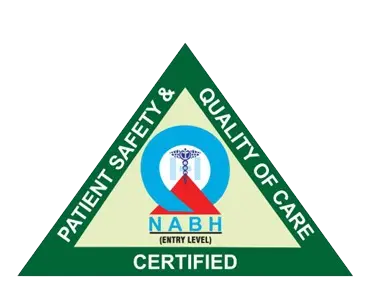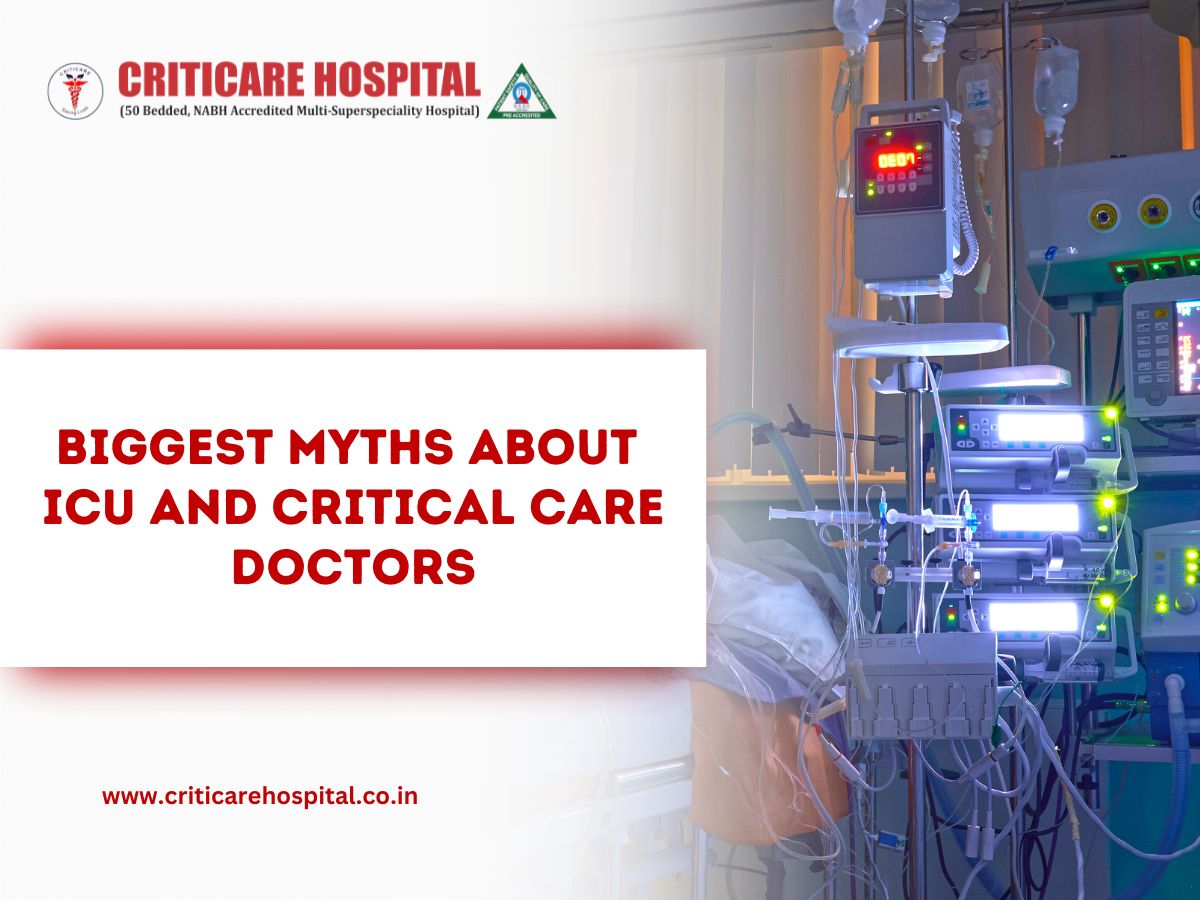The moment one hears the term “ICU,” it propels the mind towards pictures of severe illnesses, emergencies, or life-threatening situations in his thoughts. The Intensive Care Unit, or ICU, is a setting where the sickest patients are intensively looked after. It is at this plane of saving persons that the critical care doctors, known as intensivists, exist. These specialists work behind the scenes with little praise that is perhaps deserved. Several myths and misconceptions regarding this line of work have pervaded over the years.
There is a strong belief in Criticare Hospital Lucknow that knowing about ICU doctors empowers patients and families and gives comfort during difficult hours. Let us try to break down some of the popular myths about ICUs and critical care doctors.
Myth 1: ICU Doctors Only Come during Emergencies
Many believe that the ICU doctor makes an appearance during emergencies and maybe when a person is at the verge of dying. This is entirely false.
Reality: ICU doctors are there for the care of critically ill patients every day, not just emergencies. ICU doctors have been specifically trained to take care of complex medical cases that can involve multiple organ systems and life support, plus anything that can undergo sudden change in a patient’s condition. So an ICU doctor isn’t there just to save lives in crisis but to intervene with problems before they arise, sort and stabilize the patient, and lead a team of specialists to provide ideal care.
Myth 2: An ICU Doctor and Nurse Are the Same
A common misunderstanding is that ICU doctors and ICU nurses stand on the same side because of the close collaboration between them.
Reality: Intensivists are medical specialists who undergo several years of advanced training in critical care, diagnosis, prescribing treatments, and making medical decisions for those whose lives are so critical. Equally important are ICU nurses, although taking care of different responsibilities, from looking at vital signs to administering medication for patient comfort and care. Both are different yet going hand in hand upon the importance of ICU doctors and ICU nurses.
Myth 3: If You Are in the ICU, Death Is Assured
This is probably one of the most damaging myths out there. The common idea is if you go to the ICU, you will be dead for sure.
Reality: An ICU is best practiced for very intensive care and the best chance of survival for any patient. Making it past an ICU stay is often a full recovery for many. The purpose of an ICU doctor is to safely get patients through the hardest phase of their illness and onto recovery. Due to the advancements in technology and care, survival rates from an ICU stay have certainly reached much higher than in times past.
Myth 4: ICU Doctors Only Treat the Elderly or Terminally Ill
People think that only older patients or those with end-of-life conditions get admitted into the ICU.
Reality: Many are treated by ICU doctors across all ages of life-from young adults with life-threatening infections to middle-aged persons recovering from surgery or after traumatic events. While some have terminal illness, fewer than that come in as sudden health events from trauma, sepsis, heart attacks, or complications arising after surgery. The idea is to treat to maximize recovery and not just to do end-of-life care.
Myth 5: ICU Doctors Don’t Communicate With Families
Another myth circulating around is of ICU doctors being too busy or too technical to talk to the family of the patient.
Reality: At Criticare Hospital, there is constant understanding of how stressful a situation can be when an ICU patient is in the family. Such people concern themselves for communicating with the families, explaining to their family members about the patient’s condition in very simple language. Furthermore, the families are involved in the entire decision-making process. Communication between critical care doctors and patients is excellent, and such doctors show empathy, thus giving hope to families that they will comprehend the whole care plan, what expectations are set for them, and so on.
Myth 6: ICU Doctors Work Alone
Some people think that ICU doctors are like lone heroes saving lives on their own.
Reality: The care provided in the ICU is exactly that-team-based. In the ICU, doctors work hand in hand with other professionals such as nurses, respiratory therapists, anesthesiologists, pharmacists, and other specialists. Every member plays his or her role in getting the patient through recovery. The ICU has to be one of the most collaborative working environments within any hospital.
Myth 7: All ICUs Are the Same
It is thought that all ICUs operate alike in every hospital.
Reality: ICUs vary across hospitals in terms of facilities and availability of staff training and equipment. At Criticare Hospital in Lucknow, we offer a state-of-the-art ICU with the latest technology and a team of well-trained doctors and nurses conducting round-the-clock monitoring, all governed by evidence-based protocols to ensure optimum outcomes for the patients.
Myth 8: ICU doctors just use machines to treat patients
The technical apparatus and the best machines for the treatment of the patient are only enough in the ICU.
Reality: In greater contrast, ICU doctors certainly do use high-tech machines like ventilators, monitors, and dialysis units, but rely equally on their clinical judgment, experience, and medical knowledge to treat a patient. The machines are there to support the patient, but it is the doctor’s expertise that directs when and how to use them.
Myth 9: Once out of the ICU, the Job of the Doctors Are Done
Many people think that when the patient leaves the intensive care unit, the job of the ICU doctor ends.
Reality: Recovery does not end outside the ICU door. ICU doctors often see the patient during his or her hospital stay and, in some cases, even after discharge. Proper post-ICU care is necessary to ensure full recovery, and critical care physicians are instrumental in the planning and coordination of this care.
Myth 10: ICU doctors have no emotions
Because of the very nature of their work, many assume an ICU physician is cold and emotionally detached.
Reality: ICU physicians are passionate about their patients. ICU doctors face quite emotionally challenging situations every day, but they need to focus and be calm to make life-saving decisions. Every loss behind their calm faces hurts, and every recovery brings joy. They are emotionally strong, thus are counted on in such moments.
Conclusion:
The very essence of trust and comfort lies in knowing and accepting the truth behind these myths during uneasy and difficult hours. ICU and critical care doctors do have special training for managing life-threatening conditions. However, they are compassionate persons who respect the life and dignity of their patients.
In Criticare Hospital, Best Hospital in Lucknow, our ICU team is committed to providing world-class care with compassion. Our practice incorporates up-to-date medical technology with experienced hands and ok hearts. Whether it is helping you understand the situation of your dear one or helping them through recovery, we stand with you every step of the way.




